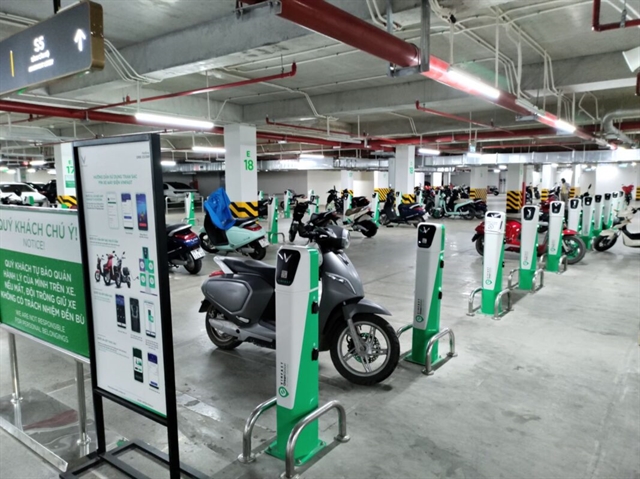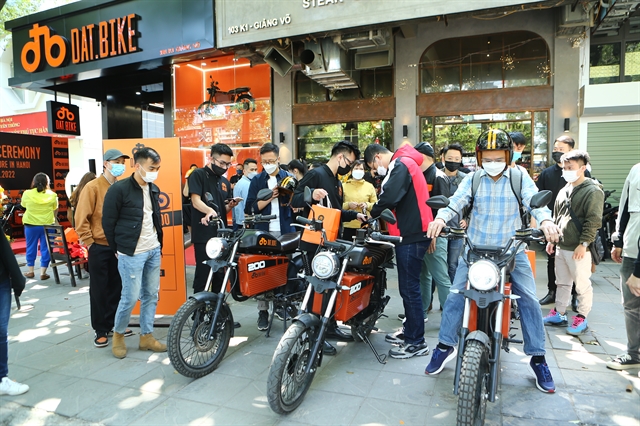Vietnamese automaker VinFast is continuing its planned expansion into the US with a $2-billion plant in North Carolina, as well as shifting its legal and financial headquarters to Singapore ahead of a potential public listing.

Vietnamese automaker VinFast is continuing its planned expansion into the US with a $2-billion plant in North Carolina and shifting its legal and financial headquarters to Singapore ahead of a potential public listing.
Such moves represent a significant step into the international market for Vietnamese EV technology. However, questions remain over how to conquer the domestic market of roughly 50 million motorbikes, among which petrol still reigns supreme.
A transition to electric for the country’s predominant mode of transport would be a major victory in meeting Viet Nam’s bold commitments at COP26, centering on a pledge to reach net-zero carbon emissions by 2050.
Despite VinFast’s efforts in producing electric bikes for the domestic market, EVs have not yet seen the widespread adoption expected, with challenges ranging from high costs to sparse charging facilities.
A lesser-known name in the EV arena, Dat Bike, is forging ahead with its own ambitions to encourage the transition, mainly by offering equivalent performance to a petrol-powered bike in an attractive two-wheeler.
“We have seen that consumers are becoming more interested in electric bikes, with big companies also gradually researching to switch partially or completely to producing electric bikes,” said Dat Bike CEO Nguyen Son.
“Therefore, the Vietnamese electric bike market is now more active. However, it will take more time for Vietnamese consumers to choose electric bikes over petrol-powered vehicles, from educating customers to researching and producing electric bike models to meet customer demand.”
In a country that has long relied on petrol vehicles that are easily accessible and cheap to maintain, companies like VinFast and Dat Bike face an uphill battle in convincing consumers to make the switch.
“At the moment, the difference in operation between electric bikes and petrol ones is still quite large, while there is a lack of strong electric bikes that can satisfy the daily commutes of customers. Therefore, the electric bike market in Viet Nam has not yet grown strongly,” the young CEO said.
Undaunted, companies still see the huge potential, especially with Viet Nam’s overall efforts to go ‘green’.

“After Viet Nam attended the COP26 conference and pledged to reduce emissions to zero by 2050, the electric vehicle market and the electric scooter market experienced strong growth,” said Le Hoang Long, Deputy Chief General Manager of E-Scooter Business Operations at VinFast.
“In addition to the Government’s encouragement, electric vehicle manufacturers have launched many new models, with breakthroughs in technology, quality and class to bring diversity to users.
“Public awareness also has seen positive improvements as the trend to switch to electric vehicles is becoming more popular. Especially after petrol prices surged recently, electric vehicles are considered an optimal choice for many families.
“Electric scooters have been in the Vietnamese market for more than 10 years, but the old products were poor quality, easily damaged, and without genuine warranties, so people only considered electric bikes as transport for students or short distances.”
Changing this perception is key to tapping that huge transport market and eventually seeing success in adopting electric bikes.
“The biggest challenge of electric bikes today is to change that prejudice of customers, persuade them to choose electric vehicles instead of petrol ones to contribute to the common goal of protecting the environment and improving the quality of people’s lives,” Long said.
In addition to avoiding soaring fuel prices, consumers could be encouraged to choose electric for their next purchase if offered incentives regarding taxes and fees, as they are in Taiwan, Indonesia and India.
The integration of technology is a centrepiece of VinFast’s strategy, with a deal signed recently with chip giant Intel to develop driver assistance systems, in-car infotainment, and internet-of-things devices for factories making EVs and batteries.
Le Hoang Long explained that VinFast’s ultimate goal was not to compete against or beat other electric vehicle manufacturers but to encourage “consumers to switch from petrol to electric vehicles to contribute to reducing emissions… [and] to jointly promote the gradual replacement of petrol vehicles.”
For many drivers, the biggest hurdle remains the high cost of EVs.
Dao Quang Thang, a designer in Ha Noi, said: “I used an electric bike when I was in high school because it did not require a driving license. The model I used was made in China because it was cheap, and I just used it to travel to school, not far from home. I drive a petrol-powered bike now. There are more types of Vietnamese electric bikes at the moment, but they are quite expensive and even more costly than my current motorbike.”
However, the limited number of manufacturers offering models in the Vietnamese market means consumers are not exactly spoilt for choice when it comes to environmentally-friendly driving.
Securing US$10 million in funding since its founding in 2019, Dat Bike is pushing ahead with attempts to combine electric tech and classic bike style. Its latest model, the Weaver 200, builds on the Weaver with upgraded performance and range, delivering a top speed of 90 km/h and a range of 200 km on a single charge.
There is clearly enthusiasm for electric bikes in Viet Nam, but the market has plenty of road left to run before we see a full-scale adoption of EVs. However, a combination of concern over rising prices and increasing climate compassion could see the switch coming sooner rather than later, especially if incentives are offered along the way. — VNS





